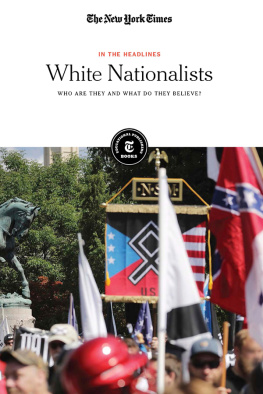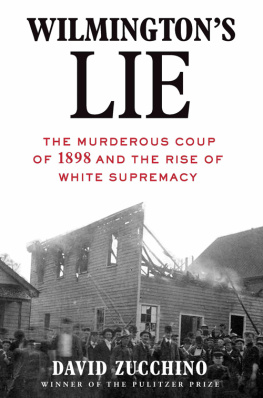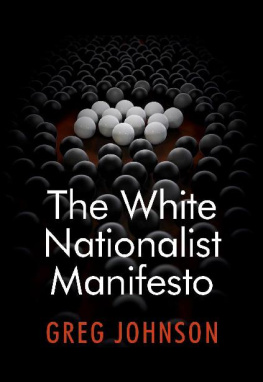ALSO BY ELI SASLOW
Ten Letters: The Stories Americans Tell Their President
Copyright 2018 by Eli Saslow
All rights reserved. Published in the United States by Doubleday, a division of Penguin Random House LLC, New York, and distributed in Canada by Random House of Canada, a division of Penguin Random House Canada Limited, Toronto.
www.doubleday.com
DOUBLEDAY and the portrayal of an anchor with a dolphin are registered trademarks of Penguin Random House LLC.
Cover design by John Fontana
Library of Congress Cataloging-in-Publication Data
Names: Saslow, Eli, author.
Title: Rising out of hatred : the awakening of a former white nationalist / Eli Saslow.
Other titles: Awakening of a former white nationalist
Description: First edition. | New York : Doubleday, a division of Penguin Random House LLC, 2018.
Identifiers: LCCN 2017061173| ISBN 9780385542869 (hardcover) | ISBN 9780385542876 (ebook)
Subjects: LCSH: Black, Derek. | White supremacy movementsUnited StatesHistory21st century. | White nationalismUnited StatesHistory21st century. | Men, WhiteUnited StatesBiography | New College of Florida (Sarasota, Fla.)StudentsBiography. | Attitude change. | Intercultural communicationUnited StatesCase studies. | Hate groupsUnited States. | WhitesRace identityUnited States. | United StatesRace relations21st century. | BISAC: POLITICAL SCIENCE / Political Ideologies / Nationalism. | SOCIAL SCIENCE / Discrimination & Race Relations.
Classification: LCC E184.A1 S245 2018 | DDC 320.54092 [B] dc23 LC record available at https://lccn.loc.gov/2017061173
Ebook ISBN9780385542876
v5.3.2
ep
For my parents
Contents
Introduction
When I first tried to contact Derek Black to write about his radical transformation, I couldnt find him anywhere. He had spent the first part of his life in the public spotlight as the future leader of white nationalism in the United States, and he left behind a daily record of his work on behalf of that ideology. It took only a few minutes of internet research to learn about his popular website for proud white children, his daily radio show, and his successful campaign for political office in Florida. The White Power Prodigy was how one news article referred to him. But then, in Dereks last public interview in 2013, he disavowed his beliefs and apologized for everything hed done, and that was it. In the public record, at least, hed disappeared.
I finally located him a few years later, when he was living across the country and attending graduate school under a new legal name. I emailed to ask for an interview, hoping to write about Derek in my job as a reporter for The Washington Post, but his answer was unequivocal. No, I am not interested, he told me, and then he asked that I respect his privacy and leave him alone. It was a reasonable request. Few people on his current college campus knew that Derek had once been the rightful heir to Americas white nationalist movementthe son of Don Black, who founded the internets largest hate site, Stormfront.org; and the godson of David Duke, a former KKK Grand Wizard. Few white nationalists knew exactly where Derek was living now, what he believed, or why he changed his mind. On the dark corners of the internet, neo-Nazis and skinheads were calling him a traitor and plotting revenge. Derek had separated his life into two parts, a before and an after, and he had no interest in connecting the two. His renunciation of white nationalism resulted in both traumatic familial consequences and nationwide speculation. What he wanted now was anonymityto keep the past in the past, he told me. I thanked him for writing back to me, and we didnt speak again for more than a year.
During those next months, the ideology he once helped spread continued to force its way into the political mainstream. Race was back at the epicenter of the countrys most polarizing debates about Hispanic immigrants, Muslim refugees, and police shootings in the era of Black Lives Matter. Donald Trump rose toward the presidency thanks in part to white identity politics, and white nationalism rebranded itself into the alt-right and attached itself onto his campaign. Dereks godfather announced another run for U.S. Senate; his father purchased new web servers to accommodate a surge in Stormfront traffic. Each week on the campaign trail, Derek heard echoes of the language he helped popularize on his radio showphrases like white genocide, reverse racism, and racial realities.
His past was in fact present, and when we emailed again in the summer of 2016, Derek said he felt implicated by current events, sometimes even culpable. Maybe he had stopped planting the seeds of hate and division, but they were still growing all around him. Its a critical time, he wrote to me, and by comparison his privacy seemed less important. My relationship to the cultural moment is now more personal, he wrote. I imagine I have some things to say about all of it. Lets find a time to meet.
Derek and I spent hundreds of hours together over the last few years, first so that I could report a story for The Washington Post and then for this book. I traveled to meet his friends and family members, and I am grateful to many of them for trusting me with not only their time but also copies of personal emails, Facebook conversations, and message board chats.
Of course, Derek took the greatest risk. Sometimes, when we spent time together, he wondered how it would feel to see his old white nationalist talking points printed out again on the page. But his commitment to this project never wavered. If parts of his story traced the countrys path to this contentious racial moment, then maybe the details of his transformation can also point a way ahead.
1. The Great White Hope
The Klansmen and neo-Nazis arrived for their meeting in the fall of 2008 dressed in suits with aliases written on their name tags and began sneaking into the hotel just after dawn. They walked past the protesters waving rainbow flags on the sidewalk, past the extra state troopers stationed outside the hotel lobby, past the FBI informants hoping to infiltrate their way inside. For several days, the government of greater Memphis had been working to prevent this white rights conference from taking place. One suburb declared a state of emergency so it could hire additional police officers; another issued a temporary ban on all public gatherings. But by 7:00 on Saturday morning, about 150 of the worlds preeminent white nationalists had gathered inside a nondescript hotel conference room where a small sign hung on the wall.
The fight to restore White America begins now, it read.
The United States had elected its first black president just four days earlier, and already the Department of Homeland Security warned of a significant spike in activity on the white racist fringe. President-elect Obama was receiving an average of thirty death threats each day. Gun sales had skyrocketed to historic levels, and by some reports far-right militia groups had tripled their membership numbers during the last year. But the white uprising that concerned the Department of Homeland Security most of all was the one beginning now in Memphis, where acoustic guitar played through the speakers and sack lunches with turkey and swiss waited on a buffet table. Its the polite face of the racist movement that now has a chance to recruit new members and broaden in scope, one DHS analyst said.








